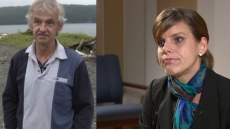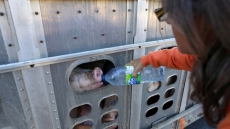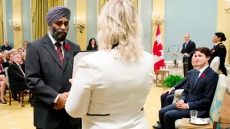Montreal can begin dumping eight billion litres of untreated sewage into the St. Lawrence River if certain risk-mitigating conditions are met, Environment Minister Catherine McKenna said Monday, calling the situation "less than ideal" but the best solution to the city's waste water crisis.
Before the city can dump the sewage into the river it needs create an emergency plan for unintended problems, keep a close watch on the discharge and deploy measures to clean up affected areas, McKenna said during a media conference call from Paris.
The city must also upgrade its monitoring of the river's water quality before, during and after the discharge and give that data to the Environment Department.
"Whenever (Montreal) meets the conditions, then they have the ability to conduct the discharge, but they must meet those conditions first," McKenna said.
Montreal Mayor Denis Coderre said late Monday that work will proceed as planned, hinting it could even start this week.
McKenna's decision brings an end to the often bitter back-and-forth sniping between Coderre and the previous Conservative government over the project.
Coderre openly accused the previous government of being anti-science and using the city's sewage crisis as political fodder during the recent federal election campaign.
The mayor has said the dump is necessary because the city must temporarily close a large sewer that feeds sewage to a treatment facility and alternative solutions would be too costly.
The city plans to relocate a snow chute and conduct critical work on aging sewage infrastructure.

Coderre's announcement in early October that the city "had no choice" but to release the sewage prompted former Conservative environment minister Leona Aglukkaq to suspend the project and order an independent scientific review.
The results of that review, released Friday, noted the discharge would have a limited impact on fish reproduction if done before the winter and monitored properly.
The scientists concluded fall is the best time to dump the sewage because doing so in other seasons could disrupt fish-spawning cycles.
Moreover, the independent panel noted that Montreal's sewer system is aging and a failure to upgrade the infrastructure could cause a rupture and an unplanned discharge of sewage during fish-spawning months.
McKenna, who was named environment and climate change minister last week, said she took issue with the way the situation was handled by her predecessor.
"I think there were problems with the way it was conducted," McKenna said, adding she wasn't pleased about making the decision.
"I'm not thrilled to be in this situation," she said. "But the best you can do is look at the evidence and make the best decision you can."
McKenna's final condition is that Montreal take part in a comprehensive review of the events leading to the incident and said she was confident the city could meet her conditions and complete the discharge before a Dec. 5 deadline.
Coderre welcomed any such post-mortem and added a technical briefing will be held Tuesday to outline the city's controlled dump plan.




